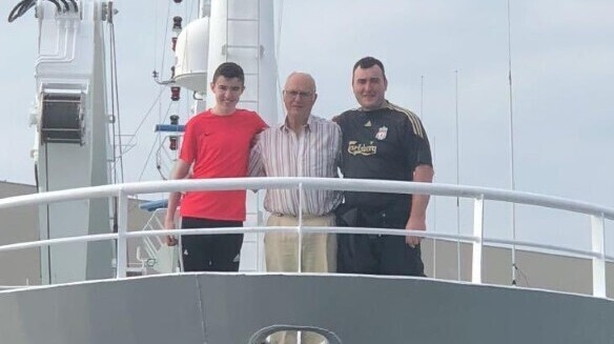Seventy-year-old Michael Cavanagh and his family have been fishing in British waters since the 1980s. Like other fishermen, he regards the English Channel as his "bread and butter".
Based in Greencastle, Co Donegal, Michael says that limiting access to UK fishing waters would pose an enormous challenge for Irish fishermen.
The UK will officially leave the EU on Friday and enter a transition period until the end of this year.
Trade talks will get under way. Those negotiations could have a dramatic impact on the fishing industry for decades to come.
Officially, the trade deal negotiations are due to last a year. The EU has warned it will require much more time, but Britain is insisting they are concluded by the end of 2020.
Today, Tánaiste Simon Coveney warned that the negotiations will be intense and potentially difficult.
The nets of the UK and its maritime neighbours across the EU, including Ireland, have been tangled for many years, but that could be about to end.
The British government today published legislation on fisheries, which says non-British vessels would not be allowed into British waters without a licence.
The proposed laws would mean the UK could operate as an independent coastal state allowing it to draw up its own policies and manage its own fish stocks.
Read more: UK government publishes Fisheries Bill to govern access to fishing waters after Brexit
As things stand, Britain will withdraw from the EU's common fisheries policy at the end of the year. That policy dictates how much UK fishermen can catch and where they operate.
Irish fishermen take at least 40% of their catch in British waters. Michael Cavanagh warns that any reduction in access to UK fishing waters would be a disaster for the industry.

"It's our bread and butter, a deal on fisheries must be sorted before the end of June, we don't want to be the sacrificial lamb for agriculture or any other area."
He said that the closure of British waters to Irish fishermen would also put major pressure on Irish fishing waters.
"If they put everyone out of British waters, the rest of the EU vessels fishing off the north of Scotland will move to Irish waters which will put more pressure on stocks and Irish fishermen."
The Killybegs Fishermen's Organisation says that seafood industry in Ireland was valued at €1.25 billion last year and employed more than 14,300 people.
Chief Executive of the organisation, Sean O'Donoghue, expressed concern at the UK Fisheries Bill published today.
"The stakes have never been higher and we will not be found wanting in fighting our corner and not allowing Brexit be the death knell for our proud industry."
Mr Coveney said fishing will be the first point of tension when trade talks between the EU and the UK begin.
A fight over fishing is likely, with the EU hoping to maintain the same access to British fishing stocks as it has now, but on the other hand the UK says it wants to take back control of its waters.
The Irish Government has already indicated that the issue of fishing in UK waters will be central to any trade negotiations.
Speaking to the BBC last week, Taoiseach Leo Varadkar said the EU will look for concessions from the UK on fishing, in exchange for the UK's financial services industry to have better access to the EU's single market.
Irish fishermen will be hoping that the status quo remains and their livelihoods protected.
But like every aspect of Brexit, there are no guarantees.







